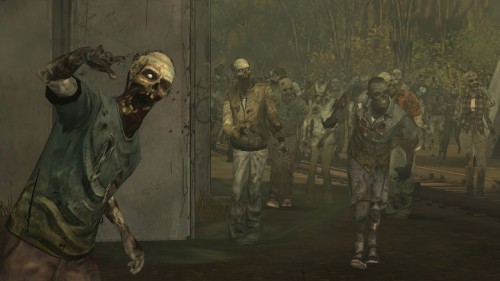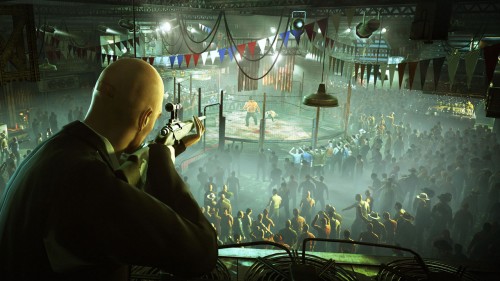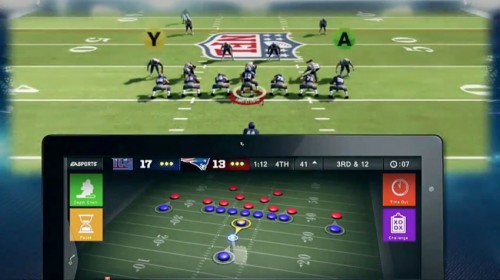If last year felt like games were running on fumes, desperate for a bit of fresh blood, it didn’t take much to predict what we were going to be seeing this year. Although I don’t think anyone anticipated it being this bad.
For reference, you can find my last few E3 conference reviews here.
Microsoft
Ugh.
It seems like the days of actually using these shows to announce things and get people excited about your platform are long gone, at least if you’re Microsoft. Where were the big, surprising reveals that get people talking, that get them excited for the coming year? There weren’t any. The handful of games that actually impressed were ones we’d seen before and were mostly venerable franchises being supplanted by their “cinematic action game” successors in which you hammer a button and cool stuff happens. Or, if you’re Black Ops II, you do the last game again with Human Revolution’s piss filter on it, which tells you that it’s the future.
But at least you can search Bing and browse Internet Explorer in Spanish now, so that’s something.
In fairness, Halo 4 looked nice, SmartGlass is a very good idea, and Matt Stone and Trey Parker had a good line. And I’m interested in LocoCycle based on that teaser, simply because it’s from Twisted Pixel. That’s it. Thank God they were smart enough to make SmartGlass cross-platform so that I don’t need a Windows Phone to use it, as otherwise it would have been dead on arrival and the sole highlight of the conference would have been two guys who didn’t really want to be there taking the piss out of it.
I’m writing this on Monday evening and crossing everything that Sony and Nintendo bring out the big guns to definitively show up that nonsense as the shite it was.
I didn’t hallucinate that they brought out Usher, did I?
D
Sony
(Full disclosure: I didn’t stay up until 4am to watch this and so my opinions are based on retroactively reading live blogs and watching videos.)
Like last year, I thought Microsoft had left the door open for Sony to steal the limelight, and once again, Sony resolutely failed to do so. Arguably even more so.
First of all, I suspect that Sony has given up on the Vita. Its sales have been poor and there’s been a negative buzz around it, but at the time of writing, with an hour-long Nintendo show dedicated to 3DS software coming up tomorrow, all that was given to the Vita in two hours of Sony setting out its stall for 2012/2013 was a brief mention of exclusive versions of Call of Duty and Assassin’s Creed. We’ve been here before with the PSP and it didn’t work, and that was several years after release when the hype had dried up and nobody cared any more. To let the Vita get to this point is bad, but to do it within six months of launch is shocking, and if I’d dropped £230 or more on this thing I’d be fucking angry at this non-showing.
The PS3 fared better, but like the situation with the 360, it’s clear that the big guns are tied up on bigger and better things. God of War: Ascension? I don’t care. Like Gears of War: Judgment, it’s a B-team project based on a franchise that has run its course, and that demo could have been any of them. The best and worst thing about any David Cage game is that it’s a David Cage game, and I can’t stand Ellen Page so Beyond is immediately on the back foot for me. Wonderbook is interesting and ambitious but is doomed to be another failed initiative like Move. If I want to read a book I’ll, you know, read a book.
The Last of Us was the best of the show by far, showing Sony’s reliance on Naughty Dog to consistently pump out the kind of experiences that this generation promised. You’d think it would be working on it’s big PS4 title, having wrapped up Uncharted so nicely – and it probably is, in reality – but this shows that there’s at least one new big hitter left in this generation. Two if The Last Guardian ever makes it out, but every missed trade show makes me less convinced that it will.
The Microsoft and Sony conferences were closer than some would like to admit, with one undeniably impressive game each and not a whole lot else, and certainly no major announcements. Sony’s was better because we saw more new games, but it goes without saying that next year is a big one for both of them. Their current consoles look like they’ll be on life support by then.
C-
Nintendo
The expectations on Nintendo’s shoulders were perhaps unfairly high given the failure of the first two conferences to show us anything worthwhile, but even with a new console to show off and such a low bar, Nintendo failed to jump it.
I’m frankly shocked at how bad it was. They actually got Ubisoft, which had knocked it out of the park yesterday with some brilliant-looking games, to give a demo of Batman: Arkham City. That game will be a year old by the time the Wii U launches, and it’s not like it was brimming with new features and content to get us coming back to it. Gimmicky touch controls that people have complained about for as long as iOS has been hosting games are now a fixture of Nintendo (Wii U), Microsoft (SmartGlass) and Sony (Vita) games. Enjoy.
Pikmin 3 was the highlight and then it was downhill from there. No Zelda or Metroid whatsoever. Two indistinguishable Mario games. Dance and fitness games. No price or firm release date for the Wii U, with the only notable announcement on that front being that it supports two controllers – a downgrade from pretty much every system since the N64. Oh, and it halves the frame rate if you run two of them. Have fun.
My Twitter feed was full of people hoping, praying for one ‘megaton’ before the end. An HD Zelda would have done it, at least giving us something to cling on to. Some were even talking about GTA V, notable for its absence at the other two conferences, making a surprise appearance. Nope. It was a collection of mini-games, wrapped around some social features like a Mii-filled PlayStation Home. It worked for the Wii when it was breaking sales records, so here, with no competition in the next-gen console market, is Nintendo sticking to what it now does best.
At least E3 2003 had Pac-Man VS.
D
Worst E3 ever? It’s up there. After all that build-up, the potential for a showing from certainly one, possibly three new consoles, the best showing of the whole thing was Ubisoft. Who saw that coming?



